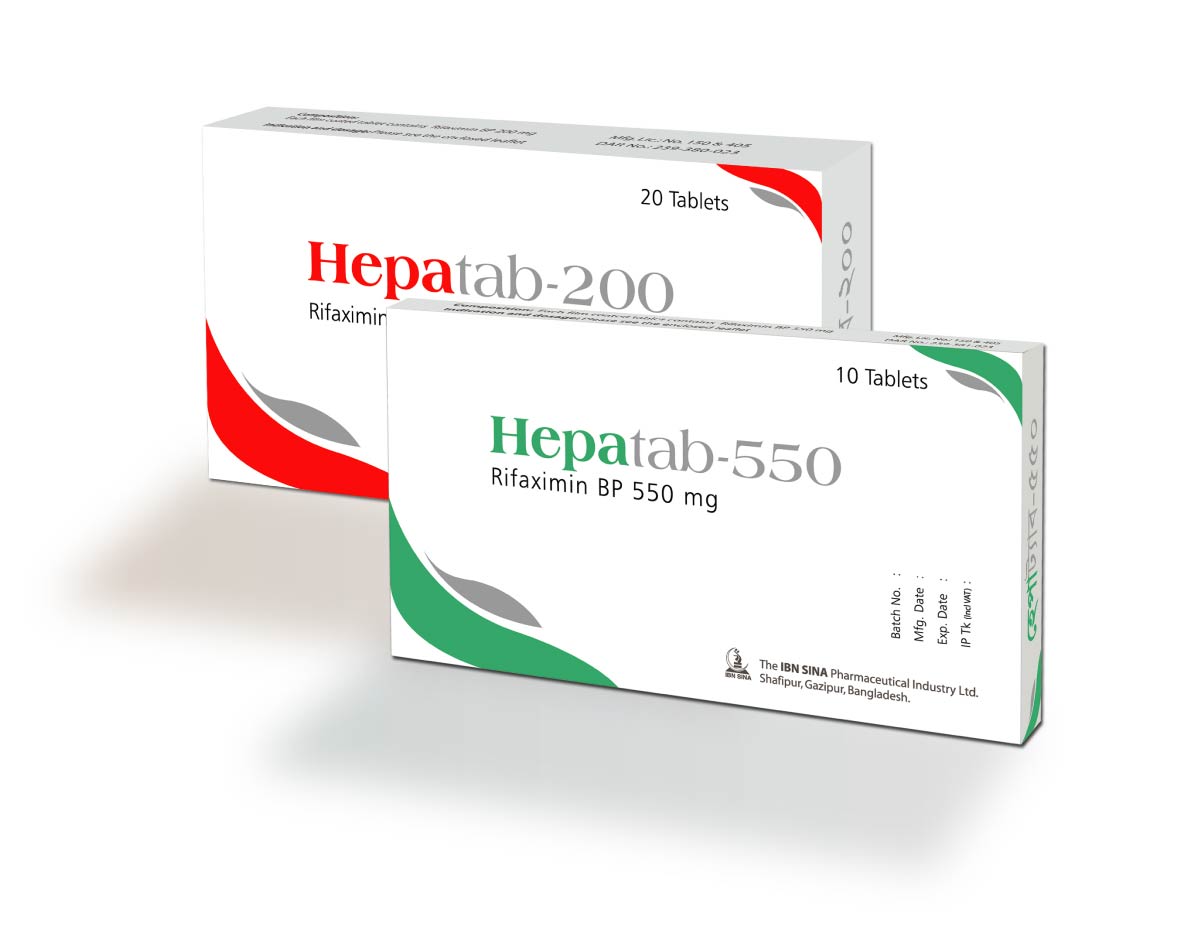
HEPATAB
RIFAXIMIN BP
| NAME | STRENGTH | PACK SIZE | DOSAGE FORM |
|---|---|---|---|
| HEPATAB 200 MG | 200 MG | 20 S | TABLET |
| HEPATAB 550 MG | 550 MG | 10 S | TABLET |
Hepatab-200 Tablet: Each film coated tablet contains Rifaximin BP 200 mg.
Hepatab-550 Tablet: Each film coated tablet contains Rifaximin BP 550 mg.
Rifaximin is a non-aminoglycoside, semi-synthetic non-systemic antibiotic derived from Rifamycin. Rifaximin acts by binding to the beta-subunit of bacterial DNA-dependent RNA polymerase resulting in inhibition of bacterial RNA synthesis.
Acute infectious diarrhea including travelers' diarrhea, Diarrhea predominant Irritable Bowel Syndrome (IBS-D), Hepatic Encephalopathy (H.E.).
Acute Infectious Diarrhea including Travelers' Diarrhea: 200 mg three times daily for 3 days. Diarrhea predominant Irritable Bowel Syndrome (IBS-D):400 mg three times daily for 10 days. Hepatic Encephalopathy (H.E.):550 mg twice daily.
Hepatab is contraindicated in patients with a hypersensitivity to Rifaximin, or any of the Rifamycin antimicrobial agents, or any of the components of this preparation
Rifaximin is not found to be effective in patients with diarrhea complicated by fever and/or blood in the stools. Rifaximin therapy should be discontinued if diarrhea symptoms get worse or persist for more than 24-48 hours and alternative antibiotic therapy should be considered. Pseudomembranous colitis has been reported with nearly all antibacterial agents and may range in severity from mild to life-threatening. Therefore, it is important to consider this diagnosis in patients who present with diarrhea subsequent to the administration of antibacterial agents.
Common side effects are nausea, vomiting, abdominal pain, flatulence, headache and dizziness.
Use in Pregnancy: Pregnancy Category C. There are no adequate and well-controlled studies in pregnant women. Hepatab should be used during pregnancy only if the potential benefit outweighs the potential risk to the fetus.
Use in Lactation: It is not known whether Rifaximin is excreted in human milk Because many drugs are excreted in human milk and because of the potential for adverse reactions in nursing infants from Hepatab, a decision should be made whether to discontinue nursing or to discontinue the drug,taking into account the importance of the drug to the mother
Although In vitro studies demonstrated the potential of Rifaximin to interact with cytochrome P450 (CYP3A4), a clinical drug-drug interaction study demonstrated that Rifaximin did not significantly affect the pharmacokinetics of midazolam. An additional clinical drug-drug interaction study showed no effect of Rifaximin on the presystemic metabolism of an oral contraceptive containing ethinyl estradiol and norgestimate. Therefore, clinical interactions with drugs metabolized by human cytochrome P450 isozymes are not expected
No specific information is available on the treatment of over dosage with Rifaximin. In case of over dosage, discontinue Rifaximin, treat symptomatically and institute supportive measures as required..
Store in cool & dry place, protect from light. Keep out of the reach of children.
Hepatab-200 Tablet: Each box contains 20's tablets in alu-alu blister pack.
Hepatab -550 Tablet: Each box contains 1 O's tablets in alu-alu blister pack.
